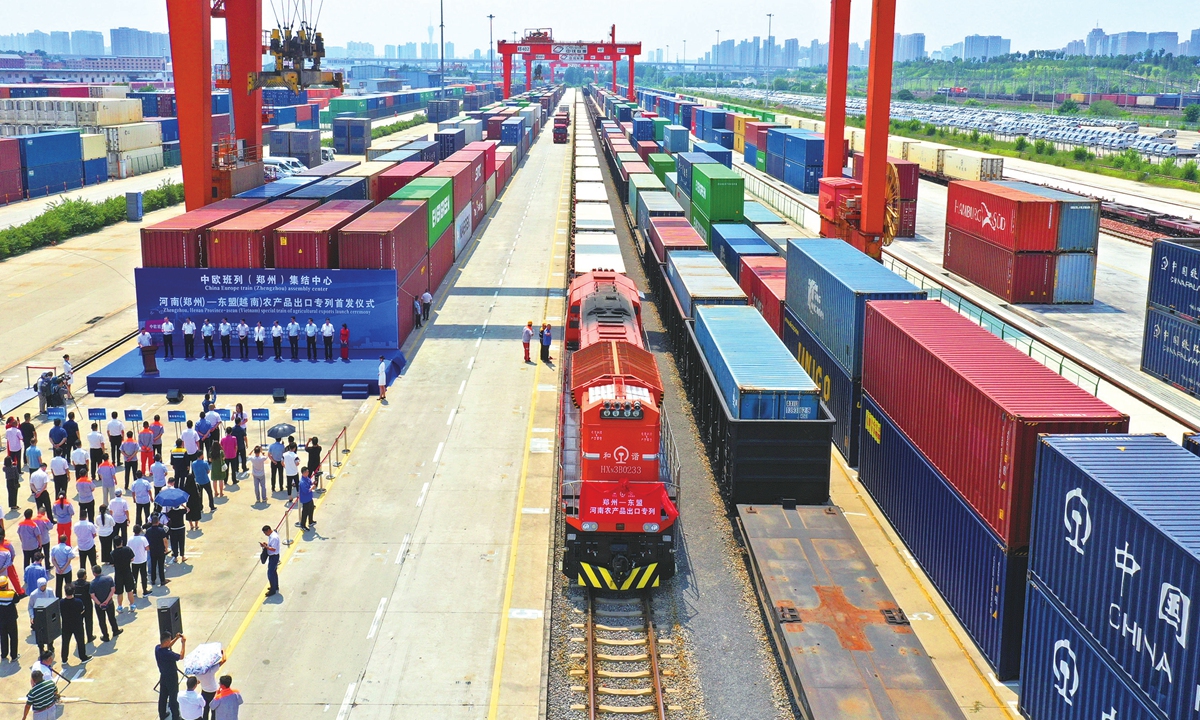
A cold-chain express train loaded with 875 tons of agricultural products leaves from Zhengzhou, Central China's Henan Province to Ho Chi Minh City in Vietnam on June 26, 2023. China has remained the largest trading partner of ASEAN from January to May, official data showed. Photo: VCG
China is ready to join hands with Vietnam to deepen and broaden pragmatic bilateral cooperation, and take the China-Vietnam comprehensive strategic cooperative partnership to a new level, Chinese Vice Premier Liu Guozhong said at the China-Vietnam Trade and Economic Cooperation Forum held in Beijing on Wednesday.
As this year marks the 10th anniversary of the Belt and Road Initiative (BRI), China is willing to start negotiations and finalize an outline of the docking between the BRI and Vietnam's "Two Corridors and One Circle" plan and strengthen policy coordination, so as to provide solid support for the two countries' economic and trade cooperation, Liu said.
Both countries have large populations and are at a similar development stage, and there is great potential for bilateral trade. China is willing to cooperate with the Vietnamese side to ease the procedures for trading through the Regional Comprehensive Economic Partnership (RCEP) and China-ASEAN free trade agreement, Liu said.
China is willing to import more agricultural products and boost healthy and stable bilateral trade. China supports Vietnam to take advantage of exhibitions like the China International Import Expo and Canton Fair and e-commerce platforms to explore the Chinese market, Liu said. Chinese companies with strength, good reputation and technology are encouraged to invest in Vietnam on basis of market and business principles, he added.
Despite sluggish global economy, China-Vietnam economic and trade cooperation has maintained sound momentum. China-Vietnam bilateral trade accounted for nearly one-fourth of that between China and the whole of ASEAN in the first five months of the year, statistics showed.
"China is already Vietnam's second-largest export destination, but there is still great development potential for China-Vietnam bilateral trade, which is set to reach a new record," Vietnam's Prime Minister Pham Minh Chinh said at the same forum.
Thanks to the two sides' political mutual trust, traditional friendship, geographical proximity, as well as comradeship and brotherhood, there is no reason we couldn't achieve our target, Pham said.
There are good conditions for the two sides to strengthen economic and trade cooperation at the moment. The stronger political mutual trust provides a solid foundation, while the full-implementation of the RCEP presents opportunities to further deepen the scope and depth of their cooperation and bring into play each other's comparative advantages, Zhuang Guotu, head of Xiamen University's Southeast Asian Studies Center, told the Global Times on Wednesday.
"The Vietnamese economy has faced some difficulties this year due to a slump in exports, and closer economic and trade cooperation with China will help the recovery of the country's manufacturing and exports," Zhuang said.
According to data released by the Vietnam Foreign Investment Agency, Chinese enterprises invested a total of $1.95 billion in Vietnam in the first half of 2023, an increase of 53.5 percent year-on-year. China ranked No. 3 among all foreign investors in Vietnam over the period, and Chinese investment covers a wide range of sectors including textiles, machine manufacturing, electronics and new energy.
"We're willing to continue to invest in industrial chains in Vietnam and contribute more to the development of China-Vietnam economic and trade cooperation," Hong Tianzhu, chairman of Chinese textile firm Texhong Textile Group, said at the forum on Wednesday.
Since 2006, Texhong has invested more than $1.6 billion in Vietnam's textile sector, with the company's yarn production accounting for around 25 percent of the country's total, Hong said, noting that the company has created more than 20,000 jobs in Vietnam and contributed to local economic growth.
"China's manufacturing capabilities combined with Vietnam's trade advantages in connecting major markets are able to complete regional supply chains and maximize the efficiency of economic and trade cooperation," he said.
Pham suggested relevant government agencies from both countries review each other's documents on economic and trade cooperation in order to provide convenience for bilateral investment, especially for Chinese enterprises to invest in Vietnam.
"The Vietnamese government will set up a working group on trade and investment to join hands with the Chinese side to make bilateral cooperation more pragmatic and effective," he said. Vietnam is strengthening infrastructure development and welcomes the participation of Chinese companies in some strategic infrastructure projects, Pham revealed.
Zhuang said the sound economic and trade cooperation between China and Vietnam has an important demonstration effect for boosting regional development and globalization, while also resisting US-led "decoupling" push and overcoming the negative impacts of US financial tightening on emerging countries.
"There is enormous potential for the development of China-Vietnam economic and trade cooperation. The Vietnamese side should further explore opportunities for border trade and step up exports of agricultural products, especially fruits, to China," Gu Xiaosong, dean of the ASEAN Research Institute of Hainan Tropical Ocean University, told the Global Times on Wednesday.
More importantly, the two sides should step up cooperation in sectors such as infrastructure and energy under the BRI proposal, experts said.
"The RECP makes China-Vietnam supply chain cooperation even broader, providing abundant opportunities for both sides. For example, Vietnam could take advantage of China's transport network and logistics to reach the European market in the future," Gu said.




